Google Play policy update, Android can also refuse ad tracking

On July 28, 2021, local time, Google announced on its official blog that it will update its Google Play policy to allow users to refuse tracking by
Android Developers Blog: Announcing Policy Updates To Bolster Privacy and Security
https://android-developers.googleblog.com/2021/07/announcing-policy-updates-to-bolster.html
In `` iOS 14.5 '' released in April 2021, Apple has enabled `` App Tracking Transparency (ATT) '' that allows users to refuse tracking for advertising purposes using the advertising identifier `` IDFA ''. It is reported that advertisers and advertising companies such as Facebook have been hit hard as a result of many users refusing to track advertisements due to the introduction of ATT.
Facebook and advertisers panicked by Apple's privacy enhancement, how much was the actual impact? -GIGAZINE

It is reported that spending on mobile advertising for competing Android devices is increasing in response to stricter regulations on iOS, but Android will also implement a function that allows you to refuse ad tracking like ATT. ' admits. Within Google , there are concerns that restrictions on ad tracking may adversely affect advertising revenue of $ 130 billion (about 14 trillion yen) per year, but Google will be released in 2021. He said he expected it to be available on Android 12-equipped devices from the second half.
Google acknowledges that ``we will gradually implement a function that can refuse to track advertisements from Android 12''-GIGAZINE
by etnyk
And Google announced on the official blog on July 28 that it will change the policy of Google Play. He said that starting in late 2021, Google Play will be making technical updates to allow users to opt out of ad tracking. We also prohibit developers from associating persistent device identifiers with sensitive user data or resettable identifiers to circumvent advertising ID resets or rejection of optimization ads.
In the new function, when the user opts out of ad optimization, the advertising ID will be deleted and replaced with a 'string of 0's.' This change will apply to Android 12 devices starting in late 2021, and is expected to roll out to all devices that support Google Play in early 2022.
While Google regulates tracking related to advertising, it recognizes that developers need to understand app usage and actions for purposes such as app analytics and fraud prevention. Therefore, Google says that it will provide developers with a new identifier called ' app set ID ' to track apps for purposes other than advertising. The app set ID will be automatically deleted if the app is uninstalled from the device or if the app is not accessed for 13 months.
In addition, Google announced that in its policy revision in May, it will establish a ' safety section ' that specifies how the app uses user data. Details about this safety section were also revealed on July 28.
Android Developers Blog: Preparing for Google Play's new safety section
https://android-developers.googleblog.com/2021/07/new-google-play-safety-section.html
Google shows off Play Store's upcoming data privacy section - The Verge
https://www.theverge.com/2021/7/28/22597534/google-play-store-safety-section-privacy-info-app-store-privacy-nutrition-labels
You can see what the safety section will look like by watching the following movie.
Introducing the new safety section in Google Play-YouTube
The safety section provides information about user data handling and privacy protection practices for apps distributed by developers on Google Play.
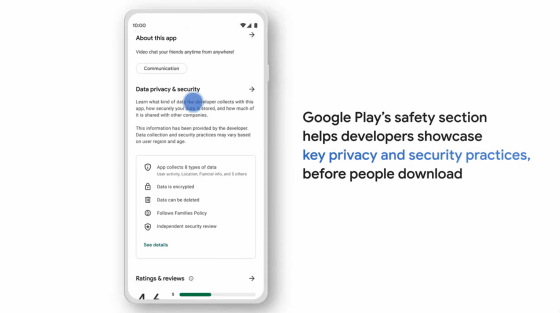
Users can check the type of user information that the app collects and the privacy protection efforts on Google Play.
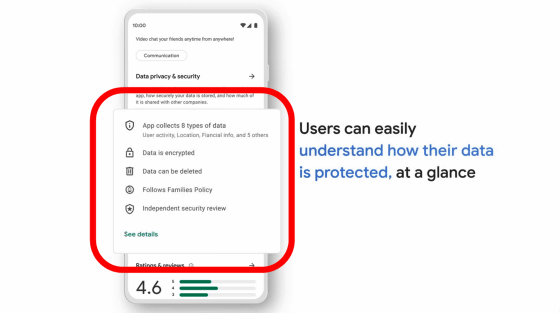
You can also check in detail what data the app collects.
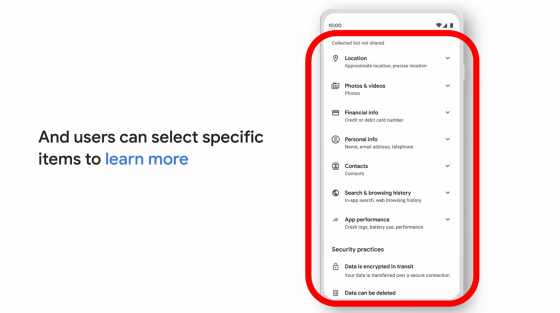
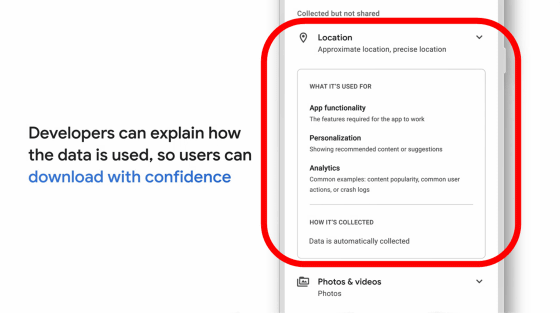
With enough information upfront, users can install your app with confidence.
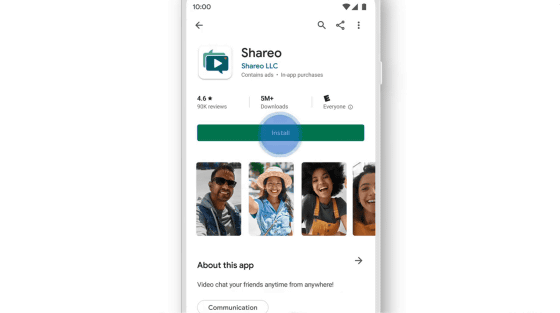
In addition to these, Google has also revealed that it will prohibit the transmission of identifiers such as advertising IDs in children's apps. In addition, in order to strengthen the security of Google Play as a whole, we announced that we will close developer accounts that do not upload applications or access the Google Play Console for one year. App developer accounts with more than 1000 installs or in-app purchases in the last 90 days will not be eligible for closure.
Related Posts:
in Web Service, Smartphone, Posted by log1h_ik





